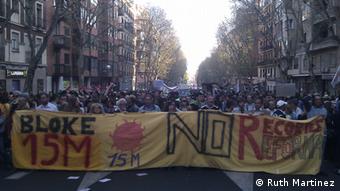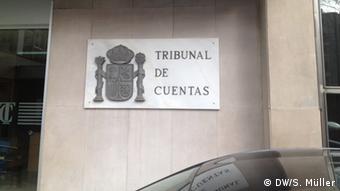Corruption wasn't openly discussed in Spain for years, but now as many struggle economically the issue is coming to the fore. However, the big question of whether anything will change remains.
Rodrigo Rato is both happy and worried. The former Spanish economic minister and International Monetary Fund director recently landed a job as a consultant to Spanish telecommunications giant Telefonica but has also been hauled into court for his mismanagement of Spain's second largest savings bank, Caja Madrid.
Telefonica has found work for a number of other high-profile Spaniards who have gotten into trouble, including Inaki Urdangarin, the son-in-law of Spanish King Juan Carlos, and Eduardo Yaplana, the former head of the provincial government in Valencia and the man many blame for the region's precarious financial situation and dependence on state aid.
Telefonica's entanglement with politics goes even further. Shortly after the conservative party Partido Popular took control of the government, the company hired the husband of deputy prime minister, Soraya Senz.
Daily media coverage
For the past several weeks, the Spanish media has been giving nearly daily coverage to corruption in the country after nearly ignoring the issue for years.
"Over the past few weeks, several scandals have emerged, but Spaniards have remained relatively calm," said Spanish lawyer Esther Martin. "With unemployment hovering at 26 percent, many fear for their jobs and prefer to keep quiet about irregularities in the conduct of their business employers.
"There's a justified impression that something is being swept under the carpet," said Martin.
Tax consultant Carlos Alaiz criticized a recently introduced tax amnesty for Spaniards who agree to return their wealth from abroad.
"This is absurd, given the fact that every other tax evader not only has to take responsibility for such behavior but must also pay the full rate - not the 10 percent tax amnesty," Alaiz said.
Around 730 Spanish politicians are currently involved in corruption cases, according to local media. During the construction boom, payoffs to local governments were the order of the day.
"Spain remains a top address for money laundering," says Paola Del Vecchio, an Italian journalist who has been writing about organized crime for years.
Little trust in government
The corruption scandals come at a time when Spain is experiencing its worst economic crisis since the end of its dictatorship. But Spaniards have little trust in their government's pledge to fight corruption.
"We've been waiting for months for an answer from the government about what it's doing about the shadow economy, misappropriation of public funds and corruption," said Victoria Anderica from Access info Europe, an organization that campaigns for more transparency in Europe. She would like to see the planned new Spanish Transparency Act, which aims to create stronger public control over economic and bureaucratic processes, also regulate party finances. Currently, only the money movements of selected politicians are monitored.
German financial expert Frank Abegg, who has worked for decades in the Spanish banking sector, said the problem with rising corruption in Spain is the slow pace of the justice system.
"The administration is so slow that the defendants have enough time to cover their tracks before the court proceedings," he said, adding that a case like the one involving a raid of Deutsche Bank without warning would be unthinkable in Spain.
Need for greater transparency
The Spanish media repeatedly criticizes the lack of independence of the country's justice system. They accuse it of being a pawn of politics. And there is currently much debate about the restraint of democratic institutions such as the Court of Auditors.
"We definitely need more transparency in all areas of public life," said Miguel Cordoba. The economist, who teaches at a private university in Madrid and who is also in charge of the finances of a company, said he believes that many businesses have extremely creative accounting practices. Even large corporations follow a very liberal interpretation of tax rules that border the legal limits.
Spanish author Leon Arsenal said the country's courts can't finalize judgments because of the intertwining of business with the state. "It often comes to bankers being pardoned and many processes being dropped," he said.
Arsenal said he thinks even the country's unions have been bought. That's why he wants to launch a new political left movement as an alternative to Spain's two large parties, the PSOE and PP, which have been in control since the end of the dictatorship.
"We need to tear everything down and rebuild it properly," he said.





No comments:
Post a Comment